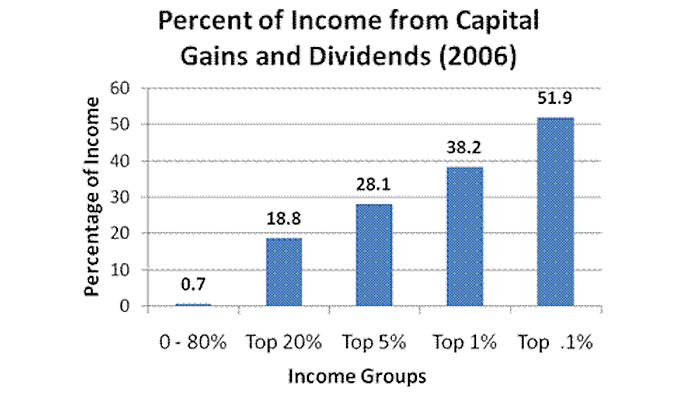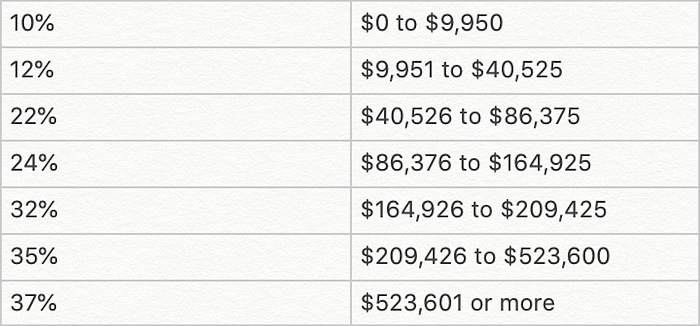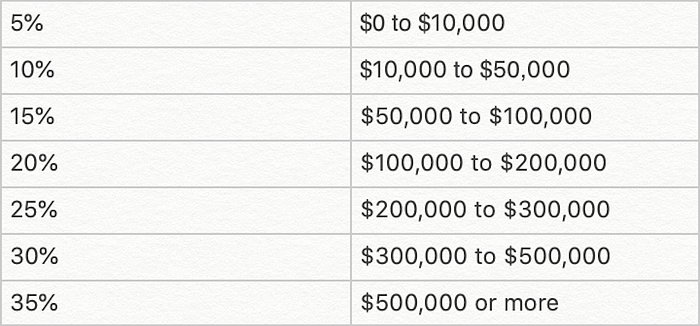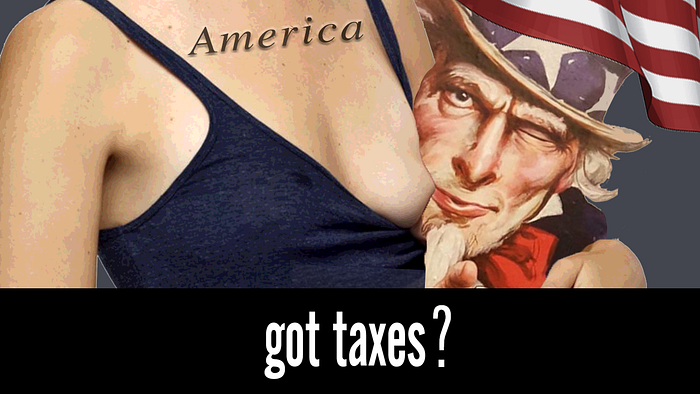We disagree on how high and progressive taxes should be, but we largely agree that unearned income (dividends, capital gains, pensions, and annuities) should be taxed at the same rate as earned income (wages, tips, salaries, net earnings) in an overall more simplified tax system.

If I could design my ideal tax system it would contain an income tax, but it would not be the kind of monstrosity we have now. It would be a flat rate tax on all income whatever source dervived less only a personal deduction and strict occupational expense. And that kind of an income tax I think would be the least inconsistent with a strong free enterprise system. — Milton Friedman
There was only one time in American history when unearned income and earned income were taxed at the same rate and it was after Ronald Reagan's Tax Reform Act of 1986.
In 2010, the Simpson-Bowles report, which was a bipartisan Presidential Commission on deficit reduction created by Barack Obama, concluded that they should be taxed at the same rate again.
Currently, the Parties have become so polarized though that some Republicans want to cut unearned income taxes even more (Trump pledged to cut the top marginal rate of capital gains from 20% to 15%) whereas some Democrats want to raise it to an unprecedented level (Biden pledged to raise the top marginal tax rate of capital gains to 40%).
Like the Tax Reform Act of 1986, a compromise would be to raise the top marginal rate for the capital gains tax while cutting earned income taxes with fewer deductions/exemptions/subsidies/credits. Tax unearned and earned the same (T.U.E.S.)!
But If I could design my ideal tax system I'd replace the existing ordinary income tax, capital gains tax, payroll tax, death tax, corporate tax, NIIT, AMT, and virtually every deduction/exemption/subsidy/credit with a single Total Income Tax (T.I.T.).
Alternative Names: Sum Income Tax (S.I.T.), Taxable Income Tax (T.I.T.), Total Income Tax To Increase Economic Soundness (T.I.T.T.I.E.S.), Gross Earnings Tax (G.E.T.), Gross Income Tax (G.I.T.), Gross Total Income Tax (G.T.I.T.).
T.I.T. would simplify our tax system, which simplicity reduces bureaucracy, corruption, avoidance, and accountancy. T.I.T. would respect Americans' freedom because instead of being forced to effectively work for the government for free by spending hours filling out paperwork it'd take us minutes to do our taxes. If a team is only as strong as its weakest link then our government is only as smart as its stupidest citizen. We need to make out government stupid simple so it's conceptually easier for our lowest common denominator to hold our public servants accountable.
T.I.T. would encourage intellectual honesty. The Left and the Right often talk past each other on taxation in part because I believe the rich want us to keep pointing our finger at the other side's rich. Divide and conquer! Taxation (except for the 1%), regulation, spending, and debt continue to rise to unprecedented levels putting a tremendous burden on the Middle-Class while the rich can afford an army of lawyers and accountants to navigate it, therefore, giving themselves a tremendous advantage in the marketplace. With T.I.T., everyone is on the same mountain and naturally the higher you are the greater the tax pressure. Most millionaires and billionaires are Democrats so one of the positives from a conservative perspective is that they wouldn't sound as bullish about taxation if they were the ones having to pay for their "compassion" (of course, some will still sound bullish because taxation is about power and so if a tax kills off small business competitors then surviving businesses can charge higher prices on more customers so it's a win-win for Big Gov/Big Biz).
T.I.T. would also reward hard work more than our existing system. Since the Puritans, America has placed a lot of emphasis on work ethic. As George Washington once said, "Work shall set you free." Work is what made the New World the leader of the world. According to studies, Americans' continue to be the hardest working people on Earth, but too much of our effort is being funneled to the top because those at the top argue convincingly enough that the economy is better when they're managing everyone's money, but I don't buy it. 54% of Americans live paycheck to paycheck. Give me a shovel and let me take my fate by my own two hands! Investors have their value, but fundamentally I believe the lion's share should always go to the person actually doing the work and so at the very least, we shouldn't structure our tax system around disproportionally penalizing the digger.
Now whether T.I.T. would be implemented as an overall tax increase or decrease would depend on the political bent of those in power at the time, but as conservative, I'd prefer it be implemented as an overall tax cut, in part, because the more popular a reform is at its outset the more likely it'll stick around for a long-time to come.
Just to give you a back-of-the-napkin conceptual idea of how this reform would work let's just consider the three biggest federal taxes (payroll, capital gains, federal income), which are responsible for about 85% of federal revenue:
Payroll Tax: 15.3% tax is taken out of workers' paychecks.
Capital Gains Tax:

Income Tax:

And so let's just combine those three taxes into one big T.I.T:
Total Income Tax (payroll + capital gains + income):

We could adjust the number of brackets and/or percentages to make it flatter and lower or vice versa. And as we collapse some of the other taxes I mentioned before into it then to maintain federal revenue percentages would have to increase, which another benefit of such simplicity is people will get a better sense of how much they actually pay in taxes. How much one pays in taxes should be made as painfully transparent as possible.
If you think my T.I.T. percentages are overly optimistic or pessimistic in their ability to fill the federal revenue hole then perhaps it could be phased up or down. For example, if federal revenue decreases by more than 5% then the following year the percentages would automatically increase by 1%, and if federal revenue increases by more than 5% then the following year the percentages would automatically decrease by 1% until over a 5-year-window the percentages may have adjusted by as much as 5%.
But sticking with the above numbers, workers would see a tax cut (including wealthy workers), which will in part be offset by how wealthy investors would see a tax increase of 10% — 15%.
Some politicians may dislike this tax reform because it's simultaneously a tax increase and a tax decrease so in our politically polarized environment it's easy for the opposition to focus on the part they dislike even if the overall tax reform is tax neutral or a tax cut.
Throughout the world, investments are generally taxed lower than income. The intellectual argument for lowering the capital gains tax is basically the same argument one makes for lowering any tax (double taxation, spurs economic growth, encourages entrepreneurship), but the argument here tends to be more successful because in politics the more vocal/powerful/niched a group is then the easier it is for them to get special privileges as the general population doesn't care as much because it ostensibly doesn't affect them. The best intellectual case for keeping unearned income taxes lower than earned income taxes is they're easier to avoid, but I find that a feature not a bug because by being collapsed into one big T.I.T. it'll apply downward pressure on a much broader tax base.
In the end, T.I.T. (or at least T.U.E.S.) would help clarify and level the playing field.
Uncle Sam is going to get his milk one way or another so it's better if America is less a pig with 12 nipples and more of a workhorse with 2 nipples.

